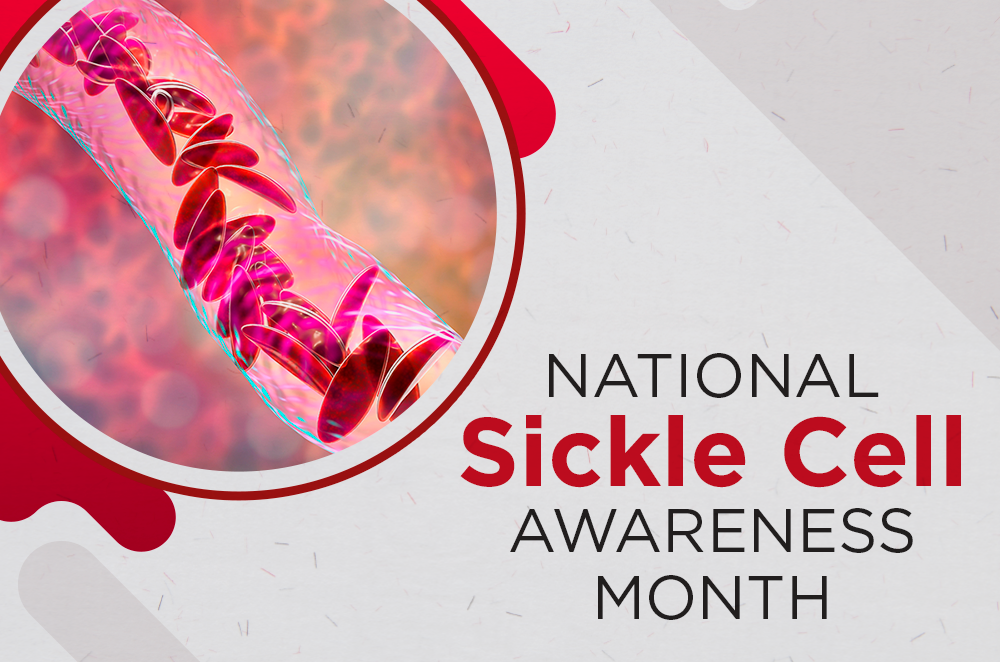Sickle cell disease (SCD) is the most common inherited blood disorder in the United States. According to the National Heart, Lung, and Blood Institute (NHLBI), nearly 100,000 Americans and more than 20 million people worldwide are affected by SCD. Until recently, treatment options have been limited. However, research has greatly expanded and has led to new therapies for SCD.
With September being National Sickle Cell Awareness Month, people living with SCD, along with caregivers, advocates, and healthcare providers, come together to help improve knowledge and understanding about the disease. Their goal is to dispel myths and stigmas surrounding it. This observance month brings attention to the ongoing need for research, better patient care, new treatments, and widely available cures.
What is Sickle Cell Disease?
Sickle cell disease is caused by a genetic mutation that affects the hemoglobin in red blood cells, causing them to become rigid and sickle-shaped. These crescent-shaped cells have difficulty passing through small blood vessels which can result in less blood reaching parts of the body. This may result in tissue becoming damaged and lead to serious conditions such as stroke and infections, as well as eye problems and episodes of severe pain.
New Treatment Options
Over the years, the National Heart, Lung, and Blood Institute (NHLBI) has supported research that has helped make important discoveries possible. Since 2017, the U.S. Food & Drug Administration has approved four new drugs to treat SCD, and NHLBI provided research funding to help support the development of several of these drugs.
The following treatment options were recently approved by the FDA:
- Hydroxyurea is an oral medicine that can reduce or prevent several SCD complications, such as acute chest syndrome, a need for blood transfusions, and pain events.
- Voxelotor treats SCD in adults and children aged 4 and older. The oral medicine prevents red blood cells from forming the sickle shape and binding together. This reduces the destruction of some red blood cells, which lowers the risk of anemia and improves blood flow to organs.
- Crizanlizumab-tmca treats SCD in adults and children aged 16 and older. Given through an IV, the medicine helps prevent blood cells from sticking to blood vessel walls and causing blood flow blockage, inflammation, and pain crises.
- Penicillin has been shown to help children with SCD, reducing the chance of having a severe infection in the bloodstream.
- Transfusions can treat and prevent certain SCD complications. Acute transfusions treat complications that cause severe anemia. Red blood cell transfusions increase the number of red blood cells and provide normal red blood cells that are more flexible than red blood cells with sickle hemoglobin. Regular or ongoing blood transfusions may help lower the chances of another stroke in people who have had an acute stroke.
In addition, through its Cure Sickle Cell Initiative, researchers at the NHLBI are exploring ways that genetic therapies may help treat or possibly cure sickle cell disease through clinical trials. Genetic therapies are innovative methods of treating genetic disorders with the introduction of new DNA into specific cells or rectifying existing DNA. Gene transfer methods, also referred to as gene addition techniques, restore the proper functionality of defective or absent genes by introducing a new gene into the affected cells.
Healthy Living with Sickle Cell Disease
It is possible for those living with sickle cell disease to live a full, healthy life. It’s important to work closely with your healthcare team and receive routine checkups. Your healthcare team can offer guidance, prescribe medications and treatment options, and address any concerns or questions. If you or a loved one have sickle cell disease and are in need of a primary care physician, check out Comanche County Memorial Hospital’s Find A Provider tool. CCMH’s medical professionals would love the opportunity to provide you with care!
Resources:
https://www.nhlbi.nih.gov/blood
https://www.nhlbi.nih.gov/health/sickle-cell-disease/treatment
https://www.nhlbi.nih.gov/health/genetic-therapies
Disclaimer
The Comanche County Memorial Hospital website does not provide specific medical advice for individual cases. Comanche County Memorial Hospital does not endorse any medical or professional services obtained through information provided on this site, articles on the site or any links on this site.
Use of the information obtained by the Comanche County Memorial Hospital website does not replace medical advice given by a qualified medical provider to meet the medical needs of our readers or others.
While content is frequently updated, medical information changes quickly. Information may be out of date, and/or contain inaccuracies or typographical errors. For questions or concerns, please contact us at contact@ccmhhealth.com.

